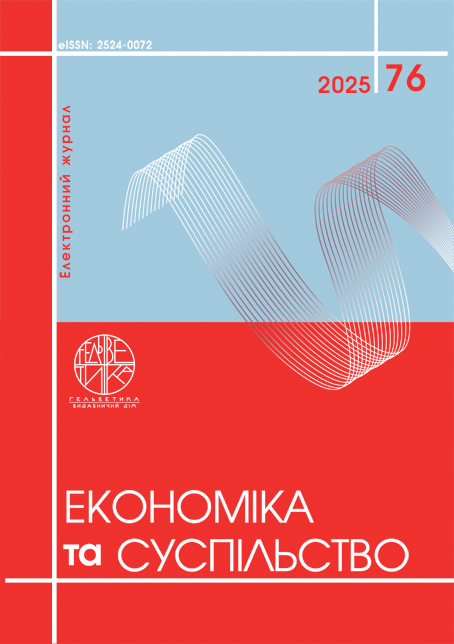COMPETENCY-BASED APPROACH TO PERSONNEL MANAGEMENT AS THE KEY TO EFFECTIVE ORGANIZATIONAL DEVELOPMENT IN THE CONDITIONS OF MODERN CHALLENGES
Abstract
The article examines the evolution of approaches to personnel management – from administrative-bureaucratic models to modern strategic human resources management, based on the competency approach. Special attention is paid to the transformation of HR management functions in the context of global crises, war, instability and changes in the labor market. The essence of the concept of competence as an integral characteristic of an employee, which includes not only knowledge, skills and abilities, but also motivation, adaptability, responsibility and the ability to self-development, is analyzed. The paper reveals the applied possibilities of the competency approach in strategic personnel management, in particular in the formation of HR strategies, personnel assessment, training and development planning. The author's graphic diagram of the structure of the competency approach is presented, which visualizes the relationship between knowledge, skills, motivation, behavior and strategic results. The importance of the conscious implementation of the approach in HR practices is emphasized, as well as its role in increasing the adaptability of organizations and creating competitive advantages.
References
Balabanova, L. V., Volianska Savchuk, L., Glushko, T., Horbatiuk, O., & Koshonko, O. (2022). Assessment of development of personnel potential of enterprises in modern business and economic processes according to the competence approach. Herald of Khmelnytskyi National University. Economic Sciences, 312(6(2)), 362–369. DOI: https://doi.org/10.31891/2307-5740-2022-312-6(2)-61 (accessed: June 28-30, 2025)
Bipar, A. (2016). Joint declaration on the social effects of digitalization by the European social partners in the insurance sector. Insurance Europe, UNI Europa Finance. Available at: https://www.insuranceeurope.eu/sites/default/files/attachments/Joint%20declaration%20digitalisation%20–%20Insurance%20Europe_UNI_0.pdf (accessed: May 28-30, 2025).
Boyatzis, R. E. (1982). The competent manager: A model for effective performance. New York, NY: John Wiley & Sons.
Cambridge Assessment. (2020). What is competence? A shared interpretation of competence to support teaching, learning and assessment. Cambridge, UK: Cambridge Assessment. Available at: https://www.cambridgeassessment.org.uk/Images/645254-what-is-competence-a-shared-interpretation-of-competence-to-support-teaching-learning-and-assessment.pdf (accessed: June 28-30, 2025)
Dubois, D. D., & Rothwell, W. J. (2004). Competency-based human resource management. Palo Alto, CA: Davies Black Publishing.
Efremova, N. F. (2019). Kompetentnisnyi pidkhid v upravlinni personalom pidpryiemstva [Competency-based approach in enterprise HR management]. Ekonomika ta suspilstvo, (21), 65–71. Available at: https://www.researchgate.net/publication/XXXXX (accessed: June 28-30, 2025)
Girard, M. (2019). Standards for the digital economy: Creating an architecture for data collection, access and analytics (CIGI Policy Brief No. 155). Centre for International Governance Innovation. Available at: https://www.cigionline.org/publications/standards-digital-economy-creating-architecture-data-collection-access-and-analytics/ (accessed: June 28-30, 2025).
Karyuk, V. I., Volianska Savchuk, L., Glushko, T., Horbatiuk, O., & Koshonko, O. (2022). Herald of Khmelnytskyi National University Economic sciences 312(6(2)):362-369. DOI: https://doi.org/10.31891/2307-5740-2022-312-6(2)-61 (accessed: June 28-30, 2025)
McClelland, D. C. (1973). Testing for competence rather than for intelligence. American Psychologist, 28(1), 1–14. DOI: https://doi.org/10.1037/h0034092 (accessed: June 28-30, 2025)
OECD. The Definition and Selection of Key Competencies. Executive Summary. Paris: OECD, 2005. 12 p. Available at: https://www.oecd.org/pisa/35070367.pdf (accessed: June 28-30, 2025)
Özçelik, G., & Ferman, M. (2006). Competency approach to human resources management: Outcomes and contributions in a Turkish cultural context. Human Resource Development Review, 5(1), 72–91. DOI: https://doi.org/10.1177/1534484305284602 (accessed: June 28-30, 2025)
Pelinescu, E. (2015). The impact of human capital on economic growth. Procedia Economics and Finance, 22, 184–190. DOI: https://doi.org/10.1016/S2212-5671(15)00258-0 (accessed: June 28-30, 2025).
Raven, J. (2001). The conceptualisation of competence. OECD Education Working Papers. Available at: https://www.oecd.org/pisa/35070367.pdf (accessed: June 28-30, 2025)
Sanchez, R., & Heene, A. (2004). The new strategic management: Organization, competition and competence. Chichester, UK: Wiley.
Copyright (c) 2025 Ольга Майстренко, Вадим Васюк

This work is licensed under a Creative Commons Attribution 4.0 International License.


